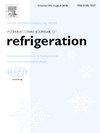Research on label propagation based on clustering and semi-supervised learning under limited fault data of air conditioning system
IF 3.5
2区 工程技术
Q1 ENGINEERING, MECHANICAL
International Journal of Refrigeration-revue Internationale Du Froid
Pub Date : 2025-03-10
DOI:10.1016/j.ijrefrig.2025.03.010
引用次数: 0
Abstract
Heat pump systems may experience various faults under complex operating conditions, making fault diagnosis crucial for ensuring reliable operation and effective equipment management. At present, related research in this area is highly dependent on labeled data, while few studies focus on using unsupervised learning to process unlabeled data. However, it is difficult to obtain real and labeled fault data, which is an important factor limiting the development of fault detection and diagnosis technology. Therefore, two label propagation strategies are proposed in this study, including the clustering-based model and the model combined with semi-supervised learning. Through the proposed method, limited labeled data can be utilized to expand the dataset. In addition, the effects of different parameters on the accuracy performance of the models are compared. Finally, the two models are optimized by using ensemble clustering, which significantly improves the accuracy of label propagation. Specifically, after optimization with ensemble clustering, the overall accuracy of clustering-based and semi-supervised label propagation models can reach up to 98.0 % and 94.5 %, respectively. In terms of label propagation accuracy for each fault type, both models avoid serious misjudgment of minority class data after optimization, and the label propagation accuracy of other types has also been effectively improved. The research results show that the method proposed in this study can effectively address the problem of low utilization of unlabeled data, thereby improving the fault diagnosis performance of the machine learning model of air conditioning system.
求助全文
约1分钟内获得全文
求助全文
来源期刊
CiteScore
7.30
自引率
12.80%
发文量
363
审稿时长
3.7 months
期刊介绍:
The International Journal of Refrigeration is published for the International Institute of Refrigeration (IIR) by Elsevier. It is essential reading for all those wishing to keep abreast of research and industrial news in refrigeration, air conditioning and associated fields. This is particularly important in these times of rapid introduction of alternative refrigerants and the emergence of new technology. The journal has published special issues on alternative refrigerants and novel topics in the field of boiling, condensation, heat pumps, food refrigeration, carbon dioxide, ammonia, hydrocarbons, magnetic refrigeration at room temperature, sorptive cooling, phase change materials and slurries, ejector technology, compressors, and solar cooling.
As well as original research papers the International Journal of Refrigeration also includes review articles, papers presented at IIR conferences, short reports and letters describing preliminary results and experimental details, and letters to the Editor on recent areas of discussion and controversy. Other features include forthcoming events, conference reports and book reviews.
Papers are published in either English or French with the IIR news section in both languages.

 求助内容:
求助内容: 应助结果提醒方式:
应助结果提醒方式:


